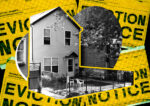The Chicago Housing Authority and city officials are sitting on property that’s been vacant for over 20 years, in the face of growing homelessness and an affordable housing crisis in Chicago.
The CHA is under scrutiny as public-interest organization Impact for Equity revealed that the agency owns nearly 110 acres of unused land and 22 acres of vacant buildings across six major sites in the city, Block Club reported.
The overstock of vacant land stems in part from the CHA’s Plan for Transformation initiative in 2000, which led to thousands of housing units being razed. The land was intended for new housing, but development delays spanning four mayors and eight CHA CEOs have left empty fields and tent encampments.
An Impact for Equity report, titled “Building on Opportunity,” emphasizes the potential for redevelopment of the vacant land to address disinvestment, and to benefit Chicago residents. The report calls on city and CHA leaders to prioritize the revitalization of these areas.
Despite the grave need for affordable housing in Chicago, Mayor Brandon Johnson has seldom addressed the CHA since taking office in May. Johnson has been taking other measures to address homelessness and affordable housing, including his controversial proposal to raise property transfer taxes on high-end deals.
“The Johnson administration is focused on increasing access to housing for all Chicagoans,” spokesman Ronnie Reese told the outlet.
Impact for Equity criticizes the decades-long development delays, noting that the CHA’s efficiency in demolishing old housing units has not translated into building new ones. The agency’s unused properties could fill 25 city blocks, while the city faces urgent demand for low-income housing. Over 200,000 people are on the CHA’s waiting lists for housing assistance.
While CHA officials contend that progress has been made in recent years, without significant changes, it may take decades before the vacant land is redeveloped, Impact for Equity stated.
Impact for Equity zeroed in on six redevelopment sites, including the Rockwell Gardens complex on the Near West Side. Despite some progress, each site remains unfinished with outdated or nonexistent redevelopment plans. The lack of community engagement in creating plans for these sites raises concerns about further disinvestment in surrounding neighborhoods.
The State Street corridor, where 48 acres of land is vacant, presents a challenge and an opportunity. The CHA aims to start a community development and an urban planning process for some of its land, including the State Street stretch, later this year, the outlet reported. However, transparency is lacking, and Impact for Equity cautions against back-room land sell-offs, which the agency has previously done.
Impact for Equity urged the city and the CHA to appoint a coordinator, allocate funding and ensure community-driven plans for each site.
—Quinn Donoghue
Read more



